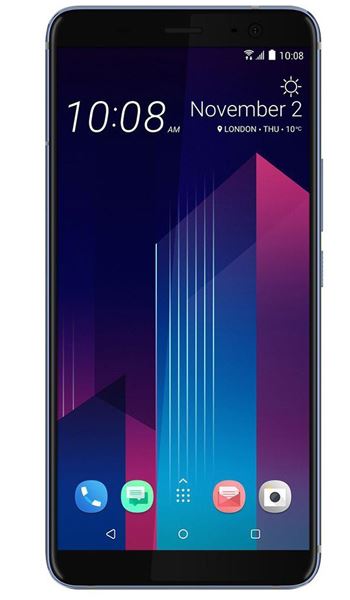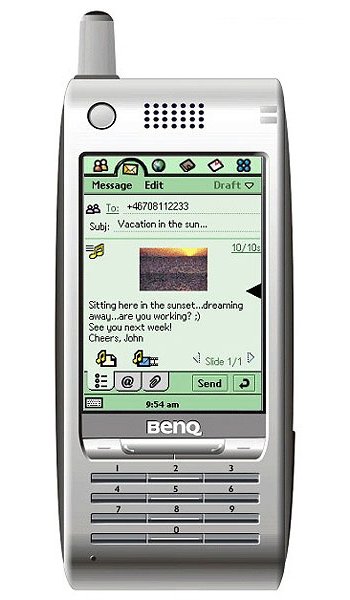HTC U11+ vs BenQ P30 Comparison and Differences
Smartphone 1

HTC U11+
Smartphone 2

BenQ P30
Smartphone 3
HTC U11+ or BenQ P30 Specs Comparison
or
 Common specs
Common specs
| Brand and model | HTC U11+ | BenQ P30 | |
| Rating | (+0) | (+0) | |
| Release date | 2017, November | 2004, Q1 | |
| Dimensions (HxWxD) | 158.5 x 74.9 x 8.5 mm | 6.24 x 6.24 x 2.95 in | 118 x 52 x 17 mm | 4.65 x 4.65 x 2.05 in | |
| Weight | 188 g | 6.63 oz | 150 g | 5.29 oz | |
| Body Build | Front/back glass & aluminum frame | ||
| Case | buy from Amazon | buy from Amazon | |
| Colors | Translucent Black, Ceramic Black, Amazing Silver | ||
| Battery | 3930 mAh, Non-removable Li-Ion | 0 mAh, | |
| Battery life |
Talking time - Up to 25 h (3G) |
Stand by time - Up to 120 h Talking time - Up to 5 h |
|
| Approximate price | 660 EUR | ||
| Check price | from Amazon | from Amazon |
 Screen
Screen
| Technology | Super LCD6 | TFT | |
| Touchscreen | capacitive touchscreen | resistive touchscreen | |
| Display colors | 16M | 256K | |
| Screen size | 6" in | 2.6" in | |
| Screen area | 92.9 cm2 | 19.9 cm2 | |
| Screen format | 18:9 (height:width) | 3:2 (height:width) | |
| Screen to body ratio | 78.3% | 32.5% | |
| Screen resolution | 1440 x 2880 px | 208 x 320 px | |
| Screen PPI /points per inch/ | 537 PPI | 147 PPI | |
| Screen protection | Corning Gorilla Glass 5 | ||
| Other specs | - Wallpapers -Downloadable pictures |
||
| Screen protector | buy from Amazon | buy from Amazon |
 Camera and Video
Camera and Video
| Rear camera, main | 12 MP, Single | 0.3 MP, Single | |
| Camera specs | -12 MP, f/1.7, 1/2.55'', 1.4µm, OIS, dual pixel PDAF | ||
| Functions | Dual-LED dual-tone flash, HDR, panorama | ||
| Video | 2160p@30fps, 1080p@30/60/120fps, HDR, 24-bit/192kHz stereo sound rec. | Yes | |
| Front camera, selfie | 8 MP, Single | 0 MP, | |
| Specifications | 8 MP, f/2.0 | ||
| Functions | HDR, panorama | ||
| Video | 1080p@30fps |
 Performance
Performance
| Operating system - OS | Android 8.0 (Oreo); Sense UI | Symbian 7.0, UIQ v2.1 UI | |
| Chipset | - Qualcomm MSM8998 Snapdragon 835 (10 nm) | - TI OMAP V1030 | |
| CPU | - Octa-core (4x2.45 GHz Kryo & 4x1.9 GHz Kryo) | - 144 MHz | |
| GPU | Adreno 540 | ||
| External memory | microSD, up to 512 GB (uses SIM 2 slot) - dual SIM model only | SD/MMC | |
| Internal memory | 128 GB, 6 GB RAM 64 GB, 4 GB RAM |
 Benchmark
Benchmark
| GeekBench 6 Single Core | 413 | ||
| GeekBench 6 Multi Core | 1320 | ||
| GeekBench 6 OpenCL | 1423 | ||
| GeekBench 5 Single Core | 386 | ||
| GeekBench 5 Multi-Core | 1459 | ||
| GeekBench 4 Single Core | 1925 | ||
| GeekBench 4 Multi-Core | 6409 | ||
| GeekBench 4 RenderScript | 7882 | ||
| GeekBench 4 Battery | 5107 |
 Communication and Connectivity
Communication and Connectivity
| SIM card | Single SIM (Nano-SIM)Hybrid Dual SIM (Nano-SIM, dual stand-by) | Mini-SIM | |
| Network | GSM / HSPA / LTE | GSM | |
| Bands | -2G - GSM 850 / 900 / 1800 / 1900 - SIM 1 & SIM 2 (dual-SIM model only) -3G - HSDPA 850 / 900 / 1900 / 2100 -4G - LTE band 1(2100), 3(1800), 4(1700/2100), 5(850), 7(2600), 8(900), 12(700), 17(700), 20(800), 28(700), 32(1500), 38(2600), 39(1900), 40(2300), 41(2500) |
||
| Speed | HSPA 42.2/5.76 Mbps, LTE-A (4CA) Cat15 800/150 Mbps | ||
| GPRS | Yes | Class 10 | |
| Edge | Yes | No | |
| Wi-Fi | Wi-Fi 802.11 a/b/g/n/ac, dual-band, Wi-Fi Direct, DLNA, hotspot | No | |
| GPS | Yes, with A-GPS, GLONASS, BDS | No | |
| NFC | Yes | ||
| USB | 3.1, Type-C 1.0 reversible connector | Proprietary | |
| Bluetooth | 5.0, A2DP, aptX HD, LE | 1.1 |
 Music and Audio
Music and Audio
| Radio | No | No | |
| Headphone jack | No | No | |
| Others | - 24-bit/192kHz audio -Active noise cancellation with dedicated mic |
 Other features
Other features
| Sensors | - Fingerprint (rear-mounted), accelerometer, gyro, proximity, compass | , Infrared port | |
| Other extras |
- Fast battery charging (Quick Charge 3.0) - IP68 dust/water proof (up to 1.5m for 30 mins) |
- MP3/MP4 player -Handwriting recognition -iTap |
Reviews and Opinions on HTC U11+ and BenQ P30
If you had to recommend one of these phones to a friend, which one would it be and why? Share your arguments using the Add Opinion button!
